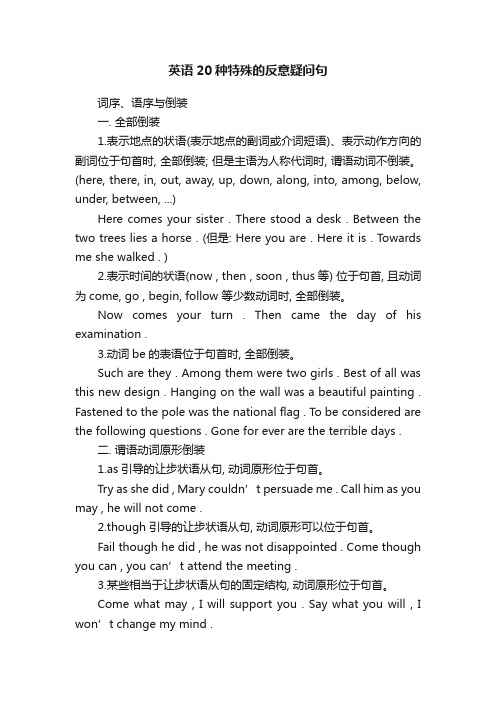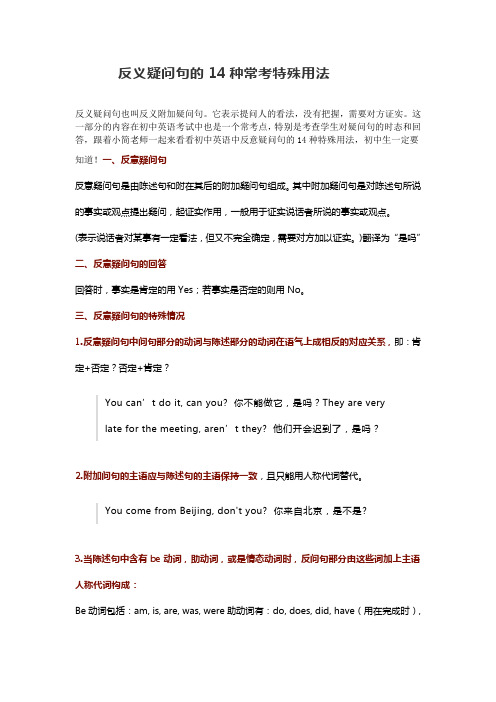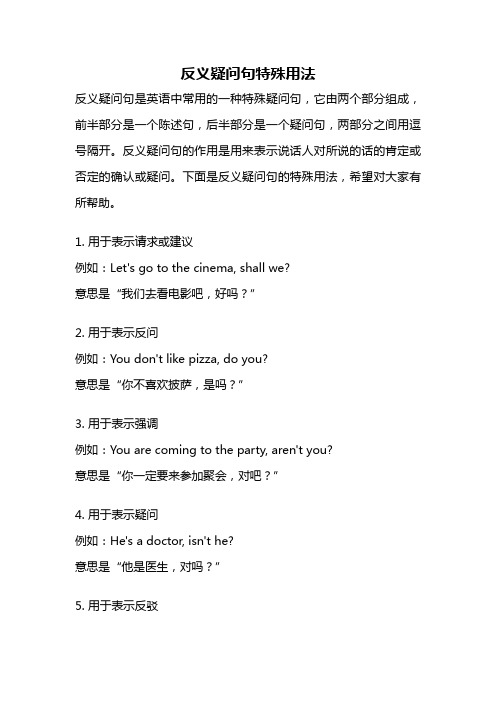反义疑问句特殊句式
英语20种特殊的反意疑问句

英语20种特殊的反意疑问句词序、语序与倒装一. 全部倒装1.表示地点的状语(表示地点的副词或介词短语)、表示动作方向的副词位于句首时, 全部倒装; 但是主语为人称代词时, 谓语动词不倒装。
(here, there, in, out, away, up, down, along, into, among, below, under, between, ...)Here comes your sister . There stood a desk . Between the two trees lies a horse . (但是: Here you are . Here it is . Towards me she walked . )2.表示时间的状语(now , then , soon , thus等) 位于句首, 且动词为come, go , begin, follow 等少数动词时, 全部倒装。
Now comes your turn . Then came the day of his examination .3.动词be的表语位于句首时, 全部倒装。
Such are they . Among them were two girls . Best of all was this new design . Hanging on the wall was a beautiful painting . Fastened to the pole was the national flag . To be considered are the following questions . Gone for ever are the terrible days .二. 谓语动词原形倒装1.as引导的让步状语从句, 动词原形位于句首。
Try as she did , Mary couldn’t persuade me . Call him as you may , he will not come .2.though引导的让步状语从句, 动词原形可以位于句首。
高中英语语法-特殊句型反意疑问句

反意疑问句反意疑问句的一般应用规则为: 前面陈述部分是肯定句形式, 后面的附加疑问部分则用否定形式; 前面陈述部分如果用否定形式, 后面的附加疑问部分则用肯定形式,英语中,反意疑问句是由陈述句和附在其后的附加疑问句组成。
其中附加疑问句是对陈述句所说的事实或观点提出疑问,起证实作用,一般用于证实说话者所说的事实或观点.比如:I'm as tall as your sister,aren't I?反意疑问句前后两部分谓语应是,“肯定陈述+否定疑问”或“否定陈述+肯定疑问”简略问句如果是否定式,not应与be,do,will等系动词、助动词、情态动词缩写简略问句的主语不用名词,应用人称代词当说话者的目的不在疑问,而是为了加强语气时,用降调当说话者的目的在疑问,则用升调1. 当陈述句的主语为anybody, anyone, everybody, everyone, somebody, someone, nobody, no one, these, those时,反意疑问句的主语用they。
E.g. Everybody knows what I said, don’t they? Nobody says a word about the incident, don’t they? Somebody borrowed your bike yesterday, didn’t they? Anybody can do it, can’t they?2. 当陈述句的主语为this, that, everything, anything, nothing, something等时,反意疑问句的主语用it。
E.g. Everything is all right, isn’t it? Nothing can stop us going forward, can it?3. 当陈述句的主语为one时, 反意疑问句的主语在正式情况下用one;在非正式情况下用you。
反义疑问句的14种常考特殊用法

反义疑问句的14种常考特殊用法反义疑问句也叫反义附加疑问句。
它表示提问人的看法,没有把握,需要对方证实。
这一部分的内容在初中英语考试中也是一个常考点,特别是考查学生对疑问句的时态和回答,跟着小简老师一起来看看初中英语中反意疑问句的14种特殊用法,初中生一定要知道!一、反意疑问句反意疑问句是由陈述句和附在其后的附加疑问句组成。
其中附加疑问句是对陈述句所说的事实或观点提出疑问,起证实作用,一般用于证实说话者所说的事实或观点。
(表示说话者对某事有一定看法,但又不完全确定,需要对方加以证实。
)翻译为“是吗”二、反意疑问句的回答回答时,事实是肯定的用Yes;若事实是否定的则用No。
三、反意疑问句的特殊情况1.反意疑问句中问句部分的动词与陈述部分的动词在语气上成相反的对应关系,即:肯定+否定?否定+肯定?You can’t do it, can you? 你不能做它,是吗?They are verylate for the meeting, aren’t they? 他们开会迟到了,是吗?2.附加问句的主语应与陈述句的主语保持一致,且只能用人称代词替代。
You come from Beijing, don't you? 你来自北京,是不是?3.当陈述句中含有be动词,助动词,或是情态动词时,反问句部分由这些词加上主语人称代词构成:Be动词包括:am, is, are, was, were助动词有:do, does, did, have(用在完成时),has(用在完成时)等情态动词有:can, could, may, might, must, will, would, shall, shouldHe will go home, won’t he? 他要回家了,是吗?She doesn’tlike to eat popcorn, does she? 她不喜欢吃爆米花,是吗?4.have的不同用法,反义疑问句用不同的动词(1)have 表“有”时,反义疑问句谓语动词用have/do都行He has a new car, doesn’t/hasn’t he?(2)have表“吃,喝,玩,度过,举办”等是,反义疑问句谓语动词用doHe has supper at home every day, doesn’t he?They had agood time in Beijing, didn’t they?(3)have to表“不得不,必须”时,反义疑问句谓语动词用doKite has to help her mother, doesn’t she?(4)had better表“最好”时,反义疑问句谓语动词用hadWe had better go to school at once, hadn't we?(5)have用在完成时中,反义疑问句谓语动词用haveThey have known the matter, haven’t they?5.(1)反意疑问句的陈述部分带有little, few, never, hardly, seldom,nobody, nothing, no one, none, neither等否定意义的词时,问句部分用肯定式。
反义疑问句的句型

反义疑问句的句型
1. 你知道“今天天气真好,不是吗?”这就是一个反义疑问句呀!比如大家一起出去玩,有人说“这地方真好玩啊”,然后接着来一句“不是吗”,是不是感觉很自然?
2. 难道你没听过“他很厉害,对吧?”这种句子吗?就像朋友在你面前展示一项技能,然后问你“我厉害吧,对吧?”。
3. “你应该会做饭,不是吗?”,这太常见啦!就像妈妈问孩子“你都这么大了,应该会做饭,不是吗?”。
4. 有没有觉得“那本书很有趣,不是吗?”这样的反义疑问句很亲切?比如在读书分享会上,有人推荐一本书后说“那本书真的很有趣,不是吗?”。
5. “你喜欢这部电影,对吧?”,哎呀,这不就是我们平时会说的嘛!像和朋友看完电影后会问“你喜欢这部电影,对吧?”。
6. “这件衣服很漂亮,不是吗?”多形象啊!比如在服装店试衣服,自己会说“这件衣服很漂亮,不是吗?”。
7. “你不会生气了吧,不是吗?”,这种时候常常会这么问呀!就像和朋友开玩笑后担心他生气,就会问一句“你不会生气了吧,不是吗?”。
8. “这个蛋糕很好吃,对吧?”,想想在吃蛋糕的时候,是不是很容易就说出这句话呢!
9. “他肯定能做好,不是吗?”,就好像对别人充满信心时会说“他那么厉害,肯定能做好,不是吗?”。
10. “你已经准备好了,对吧?”,比如要去参加一个活动,会问伙伴“你已经准备好了,对吧?”。
我的观点结论:反义疑问句在我们的日常交流中真的太常见啦,它能让对话更自然、更亲切,也能更好地表达我们的情感和态度。
特殊反义疑问句的用法归纳总结

特殊反义疑问句的用法归纳总结特殊反义疑问句是英语语法中的一种特殊问句形式,它通常由肯定或否定的陈述句加上一个与之相对立的简化疑问句构成。
这种问句形式常用于询问对方的意见、确认事实或传递反讽等表达方式。
特殊反义疑问句在日常生活及各种交流场景中都被广泛使用,了解和掌握其正确的使用方法将有助于更准确地理解和运用英语。
一、特殊反义疑问句的构成特殊反义疑问句由两个部分组成:一个主陈述句和一个与之相对立的简化疑问句。
主陈述句通常由肯定或否定形式的陈述句构成,而简化疑问句则会根据主陈述句的情况选择合适的助动词。
1. 肯定主陈述句 + 否定简化疑问句例如:- You don't mind, do you?你不介意,对吧?- She doesn't like coffee, does she?她不喜欢咖啡,对吗?2. 否定主陈述句 + 肯定简化疑问句例如:- They aren't coming, are they?他们不会来,对吗?- He hasn't finished his homework, has he?他还没完成作业,对吧?二、特殊反义疑问句的用途特殊反义疑问句可用于以下情况:1. 确认或求证信息:这种用法常用于表达对方的观点、意见或确切信息的确认。
通过特殊反义疑问句,我们可以向对方提出一个问题,并期待得到一个确认或否定的回答。
例如:- You saw him yesterday, didn't you?昨天你见过他了是吗?- She loves playing the piano, doesn't she?她喜欢弹钢琴,是吗?2. 传递反讽或非正式语气:特殊反义疑问句还常被用于表达反讽、戏谑或带有非正式语气的情感。
这种使用方式可以通过明显与事实相悖的问题形式来达到一种幽默或讽刺的效果。
例如:- He's a genius, isn't he? (He's actually not very smart)他真是个天才,不是吗?(实际上他并不聪明)- This place is amazing, isn't it? (This place is actually terrible)这地方真是太棒了,不是吗?(实际上这地方糟透了)三、特殊反义疑问句的注意事项在正确使用特殊反义疑问句时,需要注意以下几点:1. 助动词选择:简化疑问句中的助动词应与主陈述句中的谓语动词形式一致。
反义疑问句特殊用法

反义疑问句特殊用法反义疑问句是英语中常用的一种特殊疑问句,它由两个部分组成,前半部分是一个陈述句,后半部分是一个疑问句,两部分之间用逗号隔开。
反义疑问句的作用是用来表示说话人对所说的话的肯定或否定的确认或疑问。
下面是反义疑问句的特殊用法,希望对大家有所帮助。
1. 用于表示请求或建议例如:Let's go to the cinema, shall we?意思是“我们去看电影吧,好吗?”2. 用于表示反问例如:You don't like pizza, do you?意思是“你不喜欢披萨,是吗?”3. 用于表示强调例如:You are coming to the party, aren't you?意思是“你一定要来参加聚会,对吧?”4. 用于表示疑问例如:He's a doctor, isn't he?意思是“他是医生,对吗?”5. 用于表示反驳例如:You think I'm wrong, don't you?意思是“你认为我错了,不是吗?”6. 用于表示感叹例如:It's a beautiful day, isn't it?意思是“今天天气真好,不是吗?”7. 用于表示询问例如:You know how to swim, don't you?意思是“你会游泳,对吗?”8. 用于表示确认例如:You're not going to leave, are you?意思是“你不会离开,对吗?”9. 用于表示反问例如:You wouldn't do that, would you?意思是“你不会那样做,是吗?”10. 用于表示反驳例如:You don't really believe that, do you?。
反义疑问句的用法和句式
反义疑问句的用法和句式
反义疑问句是一种特殊的问句形式,用于向对方提出一个问题,以确认或否定自己的观点。
反义疑问句由一个主句和一个疑问部分组成,疑问部分与主句表示相反的意义。
一般情况下,反义疑问句的句式为:
主句陈述句,疑问部分使用相反的助动词/情态动词+主语。
以下是一些例子:
1. You don't like coffee, do you?
(你不喜欢咖啡,是吗?)
主句:You don't like coffee.
疑问部分:do you?
2. They have finished their homework, haven't they?
(他们已经完成作业了,对吧?)
主句:They have finished their homework.
疑问部分:haven't they?
3. She wasn't at the party, was she?
(她没有参加派对,对吗?)
主句:She wasn't at the party.
疑问部分:was she?
4. He can't swim, can he?
(他不会游泳,对吗?)
主句:He can't swim.
疑问部分:can he?
需要注意的是,在反义疑问句中,疑问部分的助动词/情态动词与主句的时态和人称保持一致,并使用正式陈述的词序(即将助动词/情态动词置于主语之前)。
同时,反义疑问句通常用于口语交流中,以期望得到对方的确认或否定。
反义疑问句特殊句式
反意疑问句19条:1) 陈述局部的主语是I,疑问局部要用aren't I.I'm as tall as your sister,aren't I?2) 陈述局部的谓语是wish,疑问局部要用may +主语。
I wish to have a word with you, may I?3) 陈述局部用no, nothing, nobody, never, few, seldom, hardly, rarely, little等否认含义的词时,疑问局部用肯定含义。
The Swede made no answer, did he / she?Some plants never blown (开花), do they ?4) 含有ought to 的反意疑问句,陈述局部是肯定的,疑问局部用shouldn't / oughtn't +主语。
He ought to know what to do, oughtn't he? / shouldn't he?5) 陈述局部有have to +v. (had to + v.),疑问局部常用don't +主语〔didn't +主语〕。
We have to get there at eight tomorrow, don't we?6) 陈述局部的谓语是used to 时,疑问局部用didn't +主语或usedn't +主语。
He used to take pictures there, didn't he? / usedn't he?7) 陈述局部有had better + v. 疑问句局部用hadn't you?You'd better read it by yourself, hadn't you?8) 陈述局部有would rather +v.,疑问局部多用wouldn't +主语。
中考英语备课指导:反义疑问句 特殊句式-反义疑问句
中考反义疑问句特殊句式-反义疑问句专题复习-反义疑问句反义疑问句结构:前否后肯,或前肯后否1.当陈述句部分的主语是不定代词no one,none,nobody,everyone,someone,everybody,somebody 等时,其附加疑问句的主语强调全部时可用they,强调个体时用he.No one phoned me while I was out,did they?Everyone is having a good time, aren`t they?Someone is waiting for you,isn`t he?2.陈述句的主语是复合不定代词everything,anything,something,nothing,附加疑问句部分主语用it.Everything goes well with you,doesn`t it?Nothing has been considered about this meeting,has it?3.不定代词one作主语,附加疑问句的主语在正式场合用one,非正式场合用you.One can`t be too careful,can one/you?4.当陈述句的主语是指示代词,附加疑问句主语要用相应的人称代词,即this/that用it,these/those用they.That was a hundred years ago,wasn`t it?Those are yours,aren`t they?5.陈述句部分为there be句型时,其后附加疑问句部分仍用there.There will be a special meeting tomorrow,won`t there?There used to be a lake here,usedn`t/didn`t there?6.情态动词must在反义疑问句中的用法,应由陈述部分的意义来决定。
高中英语知识点归纳反义疑问句的特殊用法
高中英语知识点归纳反义疑问句的特殊用法反义疑问句是英语中常见的语法结构,用于表达询问一件事情时,对方预期的答案是否定的情况。
它由一个正向陈述句和一个反向疑问句组成。
在高中英语学习中,学生需要掌握反义疑问句的特殊用法,包括表示推测、请求确认、提供信息以及表示意愿等方面。
本文将对这些特殊用法进行归纳总结。
表示推测:1. 表示对方可能了解某事,但并不确定时,可使用反义疑问句来请求确认或提供信息。
例句:He can speak Chinese, can't he?解析:这句话表示说话者认为对方可能会说中文,但并不确定,因此使用了反义疑问句来请求对方提供信息。
2. 当说话者根据已有的信息进行推测时,可使用反义疑问句来征求对方的意见或确认。
例句:You must be tired, aren't you?解析:这句话表示说话者根据对方的状况或行为进行了判断和推测,现在希望对方来确认是否真的疲劳。
请求确认:1. 当说话者希望对方确认说话者所提供的信息是否正确时,可使用反义疑问句。
例句:You understand, don't you?解析:这句话表示说话者希望对方确认自己所说的内容是否被理解。
2. 当说话者希望对方重复确认某个问题时,也可以使用反义疑问句。
例句:You are coming to the party, aren't you?解析:这句话表示说话者希望对方确认是否会参加派对,并希望得到对方的回答。
提供信息:1. 当说话者希望提供某个事实或消息,并希望对方确认或接受时,可使用反义疑问句。
例句:The concert is at 8 o'clock, isn't it?解析:这句话表示说话者希望对方确认音乐会的时间,并期待对方肯定地接受。
2. 当说话者希望提供有关自己或他人的信息,并期待对方提出问题时,也可以使用反义疑问句。
例句:She is from France, isn't she?解析:这句话表示说话者提供了有关某人的国籍信息,并期待对方针对这个信息提出问题,比如询问她会不会说法语等。
- 1、下载文档前请自行甄别文档内容的完整性,平台不提供额外的编辑、内容补充、找答案等附加服务。
- 2、"仅部分预览"的文档,不可在线预览部分如存在完整性等问题,可反馈申请退款(可完整预览的文档不适用该条件!)。
- 3、如文档侵犯您的权益,请联系客服反馈,我们会尽快为您处理(人工客服工作时间:9:00-18:30)。
反意疑问句19条:
1)陈述部分的主语是I,疑问部分要用aren't I.
rm as tall as your sister ,aren't I?
2)陈述部分的谓语是wish,疑问部分要用may +主语。
I wish to have a word with you, may I?
3)陈述部分用no, nothing, nobody, never, few, seldom, hardly, rarely, little 等否定含义的词时,疑问部分用肯定含义。
The Swede made no answer, did he / she?
Some plants never blown (开花),do they ?
4)含有ought to 的反意疑问句,陈述部分是肯定的,疑问部分用shouldn't / oughtn't + 主语。
He ought to know what to do, oughtn't he? / shouldn't he?
5)陈述部分有have to +v. (had to + v.),疑问部分常用don't +主语(didn't +主语)。
We have to get there at eight tomorrow, don't we?
6)陈述部分的谓语是used to 时,疑问部分用didn't +主语或usedn't +主语。
He used to take pictures there, didn't he? / usedn't he?
7)陈述部分有had better + v. 疑问句部分用hadn't you?
You'd better read it by yourself, hadn't you?
8)陈述部分有would rather +v.,疑问部分多用wouldn't + 主语。
He would rather read it ten times than recite it, wouldn't he?
9)陈述部分有You'd like to +v. 疑问部分用wouldn't + 主语。
You'd like to go with me, wouldn't you?
10)陈述部分有must的疑问句,疑问部分根据实际情况而定。
He must be a doctor, isn't he?
You must have studied English for three years, haven't you? / didn't you?
He must have finished it yesterday, didn't he?
11)感叹句中,疑问部分用用否定的助动词加sb/sth ?如:
1)What a fine day it is today !
What a fine day it is today ,isn “ t it ?
2)How fast he runs !
How fast he runs ,doesn ” t he ?
3)What a long time we have been waiting !
What a long time we have been waiting ,haven “ t we ?
12)陈述部分由neither…nor, either…or连接的并列主语时,疑问部分根据其实际逻辑意义而定。
Neither you nor I am engineer, are we?
13)陈述部分主语是指示代词或不定代词everything, that, nothing, this, 疑问部分主语用it。
Everything is ready, isn't it?
14)陈述部分为主语从句或并列复合句,疑问部分有三种情况:
a.并列复合句疑问部分,谓语动词根据邻近从句的谓语而定。
Mr. Smith had been to Beijing for several times, he should have been in China now, shouldn't he?
b.带有定语从句,宾语从句的主从复合句,疑问部分谓语根据主句的谓语而定:
He is not the man who gave us a talk, is he?
He said he wanted to visit Japan, didn't he?
c.上述部分主句谓语是think, believe, expect, suppose, imagine 等引导的定语从句,疑问部分与宾语从句相对应构成反意疑问句。
I don't think he is bright, is he?
We believe she can do it better, can't she?
15)陈述部分主语是不定代词everybody, anyone, somebody, nobody, no one 等,疑问部分常用复数they,有时也用单数he。
Everyone knows the answer, don't they? (does he?)
Nobody knows about it, do they? (does he?)
16)带情态动词dare或need的反意疑问句,疑问部分常用need (dare ) + 主语。
We need not do it again, need we ?
He dare not say so, dare you?
当dare, need 为实义动词时,疑问部分用助动词do + 主语。
She doesn't dare to go home alone, does she?
17)省去主语的祈使句的反意疑问句,疑问部分用will you。
Don't do that again, will you?
Go with me, will you / won't you ?
注意:Let's开头的祈使句,后用shall we?
Let us开头的祈使句,后用will you?
Let's go and listen to the music, shall we?
Let us wait for you in the reading-room, will you ?
18)陈述部分是"there be"结构的,疑问部分用there省略主语代词。
There is something wrong with your watch, isn't there?
There will not be any trouble, will there?
19)否定前缀不能视为否定词,其反意疑问句仍用否定形式。
It is impossible, isn't it?
He is not unkind to his classmates, is he?
有些动词如:cost hurt hit put 等,它们的过去时与原型相同,在肯定句中一定要先弄清楚它们是什么时。
